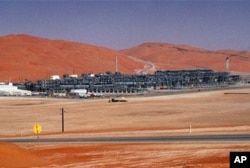Experts and investors say low oil prices are likely to continue hurting energy companies and the economies of emerging nations that depend heavily on crude oil exports, even though prices have been rising for the past few days.
Oil prices had been at an 11-year low but started to rise after a report this week said U.S. inventories of crude dropped more than analysts had expected.
The change in the balance between supply and expected demand pushed up crude prices, but they're still well below $40 -- drastically lower than the $110 a barrel seen 18 months ago.
The lower oil prices have been a boon for oil importers and consumers.
Average U.S. gasoline prices have now fallen below 53 cents per liter – an early Christmas present for U.S. motorists who had been paying $50 to fill their tanks, but now can fill the tank for about $37.
It amounts to a $115 billion boost to the U.S. economy -- or a yearly savings of $555 for every motorist, said Robert Sinclair, spokesman for the U.S. auto club called AAA.
“We think it’s something that is going to continue, plenty of crude oil supply still remains. Crude oil futures are pointing to even lower prices as we go forward in the next month or so -- so we could see prices drop another 25 or 30 cents in the next month,” Sinclair said.
Oil-producing nations
For oil-producing countries, the price declines have been bad news, economist C. Fred Bergsten told the HasthtagVOA program.
“The Russians lose, the Saudis lose, the Venezuelans lose, U.S. oil shale producers lose; but that is more than offset by the net reduction in consumer costs,” Bergsten said.
Key oil exporter Saudi Arabia is seeking to diversify its economy, and is running a budget deficit, while Venezuela is dealing with high inflation and a stalled economy, and oil-rich Azerbaijan was forced to depreciate its currency, the manat, which fell more than 30 percent against the dollar.
Because most commodities are priced in U.S. dollars, some blame the higher exchange rate for price declines. But analyst Peter Cardillo of First Standard Financial said faltering demand and growing supply are far bigger factors.
"If you have lower demand on a global scale, and then you have overproduction from producing nations, it's obvious that you're going to have a crash in oil prices, and that's exactly what's happened," Cardiollo said in an interview with VOA in New York.
Consequences
Bergsten said the price plunge is having serious geopolitical consequences in Russia and elsewhere.
"Five to 10 years ago, when oil prices were very high, (Russian President Vladimir) Putin was riding high. Now with the energy price having collapsed as much as it has, he's had to pursue foreign adventures – Ukraine, now Syria and other things – to try to divert his whole population's attention from their very poor economic circumstances driven in part by the collapse of oil prices," he added.
Some experts say oil prices are not likely to rise any time soon.
New projections from both the World Bank and International Monetary Fund suggest prices will fall further – to as low as $20 a barrel in 2016.
The Organization of Petroleum Exporting Countries (OPEC) forecast Wednesday a global oil price of about $70 a barrel by the year 2020 and $95 by the year 2040.
It expects that the current oil glut will dissipate as demand rises. For now, OPEC has decided not to cut production.
No significant increases
John Demopoulos is a senior market strategist with Argus Media, which watches global energy and commodity markets. He told VOA the OPEC forecast is like predicting what the weather will be like in four years.
Demopoulos said he sees nothing on the horizon that would indicate significant price increases in 2016.
He said Iran will be putting more oil on the market as it gets out from under some sanctions that have hampered their exports, and a new law allowing U.S. crude exports for the first time in decades will not change the market very much.








